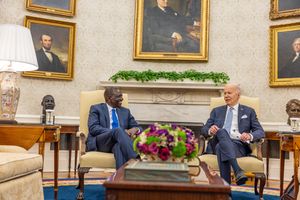
Anti-government protesters march along Moi Avenue in Nairobi on July 23, 2024.
In 'The Second Coming,' the iconic poem by William Butler Yeats, the phrase “the falcon cannot hear the falconer” aptly describes Kenya’s current existential political predicament. We can only hope the other poignantly memorable phrases from that poem, especially “things fall apart,” “the center cannot hold,” and “mere anarchy is loosed upon the world,” will not be Kenya’s potion, its poisoned chalice.
I say this because post-colonial states, of which Kenya is a classic variant, are essentially nonsense on stilts. They can, as we’ve seen elsewhere, including in our neighborhood, quickly go to hell in a handbasket. To avoid this cataclysm, we must beat into our noggins the 101 of the art of listening. Otherwise, we all sink together.
Scholars often talk of nations as a social contract between the state and the citizen. Kenya’s own David Ndii, the erudite and wildly unpopular economist, even called Kenya “a cruel marriage” from which some sub-nations could consider exiting. It was a provocative idea, but not one that was intellectually illegitimate. That’s because Kenya hasn’t cohered as a nation with a common identity and zeitgeist.
We can’t, for example, define Kenya, or a Kenyan, as an idea. Kenya, as a state, isn’t irreversible. It can easily go the way of other collapsed post-colonial states. Kenya’s political elites knocked on that door in 2008 before they were forced to pull back. We saw with our eyes what Armageddon looks like.
My years of intellectual labour tell me that we’ve arrived at an historic inflection point. That’s the point at which we either break apart, or find a new beginning. We need to think hard and ask unthinkable questions. Is ours really a cruel marriage? And if so, does it have a point of redemption?
Who is going to be our marriage counselor? Can we counsel ourselves into salvation? Are our ruling political elites tone deaf? Do they hear, and understand, what the citizens are saying? Or are they drunk with power? Have they internalised the central fact of the liberal democratic state – that the highest office in the land is not that of President, but of a single Citizen?
Trouble with marriage is that it’s an imperfect union. It’s a contract of personal interests camouflaged by an amorphous phenomenon we call love buttressed by the seduction of sex. In the nomenclature of the state and the citizen, love is what the state must do to give economic meaning to the life of the citizen, and the sex is the identity that the state must forge in the citizen.
Blissful marriage
That’s where the romance of the state and the citizen comes from to create a blissful marriage. From what I can see, citizens in Kenya have never had a blissful marriage with the state. But it’s the state, not the citizen, which has refused to requite the love of the latter.
Today, it seems to me that citizens – most outwardly in the form of the Gen Z – have decided to force the state to love them, or else. But it’s in that “or else” where the devil resides. Or else what? If you ask me, I think right now the state and the citizen are two ships passing each other in the night. Joseph de Maistre, the French philosopher, opined that “in a democracy, people get the government they deserve.” Kenya is a democracy, albeit an illiberal one. In that sense, Kenyans elect their leaders every five years. In 2022, they elected Kenya Kwanza over Azimio. I don’t want to belabor the fairness of the election. It’s now what it is.
Kenyans elected MPs, Senators, Governors, and MCAs. From what we see with our own eyes, most of these elected officials are crooks. No one forced Kenyans to elect crooks. And it wasn’t the first time they have done so eyes wide open. So, perhaps we can be spared the crocodile tears. Even so, many voters and Gen Zs have decided they want to write a new contract with the state. That’s in order.
The state must now listen carefully and openly participate in writing that new compact with the citizen, or risk the collapse of the country if it doesn’t. If Kenyans have said they want a new normative state – one that’s free of corruption, impunity, and high-handedness – then the state for its own survival cannot stand in the way.
Kenyans as a whole suffer intellectual vacuity. I mean the vast majority of Kenyans in the ruling class and the hoi polloi. They talk too much with too little information and knowledge, and listen not. The art of listening is lost to them. It’s OK to shout “Ruto Must Go.” Then what? Does DP Rigathi Gachagua take over? Or Speaker Moses Wetangula? Or should the constitution be overthrown and the military takes over? Let’s be serious and think about what we are saying and its implications long-term. President William Ruto and every Kenyan must think hard.
Makau Mutua is SUNY Distinguished Professor and Margaret W. Wong Professor at Buffalo Law School, The State University of New York. @makaumutua.









